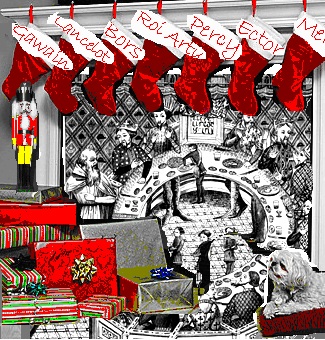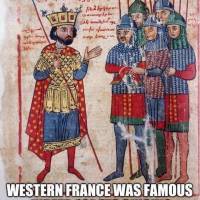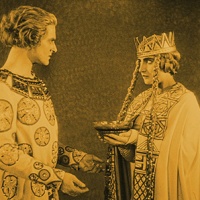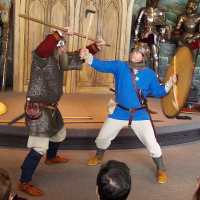
Ever since our matchless maiden mother Mary delivered our Christ in the most modest of accommodations in Bethlehem, wondrous things have always occurred during Christmastide. That was the selling point that won the Saxons to Christianity during the 6th century – or at least it should have been – and it’s the same thing that mesmerizes us today when we are in presence of life-size inflatable snow globes and the like.
So, as we gather with our neighbors on Christmas Day, we will almost certainly find ourselves surrounded by poor souls who do not share our same ideas of The Holiday. These heathens do not know, for example, the importance of Christmas to King Arthur and his Knights of the Round Table. Wondrous things occurred in Camelot during Yuletide, yet somehow we tell stories of other things said to have occurred on this special day.
Let us not forget the miracle of the sword of the stone – for it was during Christmas that Merlin advised the Archbishop of Canterbury to summon all of the barons in the realm to London for a very special Christmas celebration:
Thenne Merlyn wente to the archebisshop of Caunterbury / and counceilled hym for to sende for
alle the lordes of the reame /
and alle the gentilmen of armes that they shold to london come by Cristmas vpon payne of cursynge[1]
Let’s let the King of mankind show us, on this auspicious day, who should be the king of our realm:
And for this cause that Jesus that was borne on that nyghte
that he wold of his grete mercy shewe some myracle
as he was come to the kynge of mankynde for to shewe somme myracle who be
rightwys kynge of this reame[2]
The barons and their knights arrived to a miraculous sight – and it wasn’t what was inside the church either. The visitors were so marveled by the sword in the stone exhibit that Merlin installed, that the Archbishop nearly lost his audience to it:
Thenne the peple merueilled & told it to the Archebisshop I commande said tharchebisshop
that ye kepe yow within your chirche /
and pray vnto god still that no man touche the swerd tyll the hyghe masse be all done[3]
It’s amusing to picture the Archbishop getting ready for his big appearance at mass, only to realize that everyone was outside looking at something else – on one of the biggest church days of the year no less!
Today many men spend mass with their eyes glossed over in a fantasy football game. Not much has changed because in the medieval world, these same men passed their mass thinking about the jousting tournament that would take place after the service. For, it was really the promise of feasting and swordplay that brought these men to London and not the Archbishop’s wise words. After mass, the men gathered around the sword:
So whan all masses were done all the lordes wente to beholde the stone and the swerd /
And whan they sawe the scripture / som assayed suche as wold haue ben kyng /
But none myght stere the swerd nor meue hit He is not here said the Archebisshop that shall
encheue the swerd but doubte not god will make hym knowen[4]
The knights stuck around London for a few more days of revelry. In medieval Britain, Christmas, or “Christmastide” was a festival that typically lasted twelve days and New Year’s Day was part of the Christmas celebration. There was a great tournament in London that year on New Year’s Day and it was on that same day that Kay was in such a hurry to get to church on time for morning mass that he left his sword back at the house. He asked his foster brother Arthur to fetch it for him – and we all know what happened next…

Arthur (played by Nigel Terry) draws the sword from the stone in John Boorman’s Excalibur (image: copyright 1981 Orion Pictures/Warner Brothers)
In medieval Britain, presents were typically exchanged on New Year’s Day and not Christmas Day as is done in America today. Though “Christmastide” typically lasted twelve days, we see in Sir Gawain and the Green Knight, that King Arthur didn’t follow the status quo – Camelot partied for a full fifteen days!
| This kyng lay at Camylot upon KrystmasseWith mony luflych lorde, ledez of the best,Rekenly on the Rounde Table alle tho rich brether,With rich revel oryght and rechles merthes.Ther tournayed tulkes by tymez ful mony,
Justed ful joilé thise gentyle knightes, Sythen kayred to the court caroles to make. For ther the fest watz ilyche ful fiften dayes, With alle the mete and the mirthe that men couthe avyse… (Fitt 1, v. 37-45)[5] |
The king spent that Christmas at CamelotWith many gracious lords, men of great worth,Noble brothers-in-arms worthy of the Round Table,With rich revelry and carefree amusement, as was right.There knights fought in tournament again and again,
Jousting most gallantly, these valiant men, Then rode to the court for dancing and song. For there the festival lasted the whole fifteen days With all the feasting and merry-making that could be devised… (Part 1, v. 37-45)[6] |
Well, since Arthur pulled the sword from the stone on New Year’s Day and everything, he expected no less of his subjects on that holiday. He was notorious for refusing to eat at holiday dinners until he had either heard some wondrous tale or had at least seen someone jump “over men and horses hoops and garters lastly through a hog’s head of real fire”[7]:
| …he wolde never eatUpon such a dere day er hym devised wereOf sum aventurus thing an couthe tale,Of sum mayn mervayle, that he might trawe,Of alders, of armes, of other aventurus,Other sum segg hym bisoght of sum siker knyght
To joyne with hym in justyng, in jopardé to lay Lede, lif for lyf, leve uchon other, As fortune wolde fulsun hom, the fayrer to have. (Part 1, v. 91-99)[8] |
…he would never eatOn such a special day until he had been toldA curious tale about some perilous thing,Of some great wonder that he could believe,Of princes, of battles, or other marvels;Or some knight begged him for a trusty foe
To oppose him in jousting, in hazard to set His life against his opponent’s, each letting the other, As luck would assist him, gain the upper hand. (Part 1, v. 91-99)[9] |
So, be sure to tell a tale of wonder during your Christmas holiday and challenge a mate to a sword fight or a wrestling match or something – it will make our trewe kinge happy.
[1] Caxton’s Malory in Middle English from Middle English Compendium (leaf 20v) available online: http://name.umdl.umich.edu/MaloryWks2
[2] Caxton’s Malory in Middle English (leaf 20v)
[3] Caxton’s Malory in Middle English (leaf 20v)
[4] Caxton’s Malory in Middle English (leaf 20v)
[5] Sir Gawain and The Green Knight: Middle English Text with facing Translation, Ed., Trans. James Winny (Peterborough, 1992), 4.
[6] Sir Gawain and the Green Knight, 5.
[7] The Beatles, “Being for the Benefit of Mr. Kite,” Sgt. Pepper’s Lonely Hearts Club Band (Parlophone, 1967).
[8] Sir Gawain and the Green Knight, 6.
[9] Sir Gawain and the Green Knight, 7.













